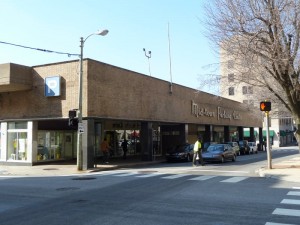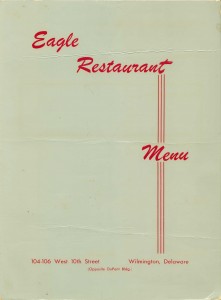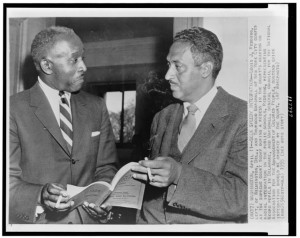Local legal historic sites – Midtown Parking Center and Eagle Coffee Shoppe
This ordinary mid-century parking garage once played an important part in the struggle to end segregation in Delaware. In 1958, William H. Burton, an African American and member of the Wilmington City Council, entered the Eagle Coffee Shoppe, a restaurant on the ground floor of the parking garage and was refused service. The restaurant, like most restaurants and theaters in Wilmington at that time would not serve African Americans. The parking garage was built and maintained by the Wilmington Parking Authority, which had leased space to shops and a restaurant in order to defray the cost of the garage. Burton, represented by Louis L. Redding, filed suit in the Delaware Court of Chancery against the restaurant and Parking Authority. The case was eventually appealed to the United States Supreme Court which found in Burton v. Wilmington Parking Authority 365 US 715 (1961) that because the restaurant was in a government owned building, refusing service to Burton on the basis of his race violated the Equal Protection Clause of the Fourteenth Amendment.
In a 1998 interview, attorney Frank H. Hollis remembered how the case started. Seven African-American Chrysler workers had been arrested and charged with trespassing for trying to eat in the Eagle Coffee Shoppe. Hollis represented the seven. After conferring with Louis Redding and the NAACP, councilman Burton was asked to be a test case. When Burton was also denied service, Redding filed the suit against the Wilmington Parking Authority and the restaurant.
Burton’s attorney Louis L. Redding, was the first African American attorney in Delaware. He had a long legal career in Delaware and argued many important civil rights cases. Besides Burton v. Wilmington Parking Authority he was also the attorney for the plaintiffs in Gebhart v. Belton which eventually was heard as part of Brown v. Board of Education of Topeka, 347 U.S. 483 (1954).
The parking garage is now closed, though it still stands at the corner of 9th and Shipley. The Eagle Coffee Shoppe has been gone for many years and is currently the location of the Ninth Street Book Shop.
UPDATE: The Midtown Parking Center was demolished in 2013 to be replaced by an apartment complex.
Sources:
Frank H. Hollis. My Memories of Law Practice in Wilmington, Delaware. Del. Law., SUMMER 1998, at 22
Carolyn D. Mack. The Other Side of Equity: The Court of Chancery and Civil Rights. 5 Del. Law. FALL 1986 at 20 (1986)
Harvey Bernard Rubenstein. Delaware Controversies That Have Shaped the Constitution. 6 Del. Law. 122 (1987-1988)
Robert E. Whiteside. Parking Facilities Developed in Merchant-City Programs. 13 Traffic Quarterly 294 (1959)
and thanks to Jack Buckley, Ninth Street Book Shop


